Faculty
OTTOMAN AND TURKISH STUDIES FACULTY
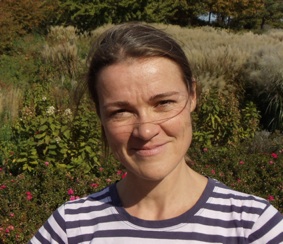
Helga Anetshofer
Lecturer in Turkish and Uzbek
Old Anatolian Turkish language and literature, Irano-Turkic language contact, Turkic linguistics
Helga Anetshofer (PhD, Vienna University 2001) has taught a comparative course on historical and modern Turkic languages, as well as courses in Turkic languages and literatures (Ottoman, Turkish, Kyrghyz, Middle Turkic) at Free University, Berlin; Eastern Mediterranean University, Famagusta (Cyprus), and Harvard University before joining the University of Chicago in 2009. Helga is an Ottoman philologist by training, and her research focuses on Old Anatolian Turkish (14th-15th centuries) grammar (morpho-syntax, lexicon, etymology) and literature (prose legends and epics, translation literature). Between 1996-2003 she had been regularly contributing to the late Andreas Tietze’s Historical and Etymological Dictionary of Turkish Project (Tarihi ve Etimolojik Türkiye Türkçesi Lugati; vols. 1, 2, 2002, 2009). Her research interests also include gender issues, as well as material culture and social history of Anatolian mysticism. Currently Helga is preparing an annotated edition of the earliest rhymed version of the Vilayetname of Hacı Bektaş, the key text of Anatolian Alevism, in collaboration with two other colleagues.
- “Neues zur altanatolisch-türkischen Pferdeterminologie.” “Die Wunder der Schöpfung”: Mensch und Natur in der türksprachigen Welt. Editors Brigitte Heuer, et al. (Würzburg, 2012), 143-158.
- “Legends of Sarı Saltık in the Seyahatnâme and the Bektashi Oral Tradition.” Evliyâ Çelebi: Studies and Essays Commemorating the 400th Anniversary of his Birth. Editors Nuran Tezcan, et al. (Istanbul, 2012), 296-304.
- “Seyahatnamede dilbilime dair kaynaklar” Evliya Çelebi Seyahatnamesi’nin Yazılı Kaynakları. Ed. by Hakan Karateke and Hatice Aynur (Ankara, 2012), pp. 270-285.
- „Zahnentgelt“ – ein Terminus des Gastrechts zwischen Persisch und Türkisch. [„Tooth rent“ (diş kirası) – a Hospitality Term between Persian and Turkish]. In: H. Anetshofer, I. Baldauf, Ch. Ebert (eds.). Über Gereimtes und Ungereimtes diesseits und jenseits der Turcia: Festschrift für Sigrid Kleinmichel zum 70. Geburtstag. (Schriftenreihe Ost-West Diskurse; 7). Schöneiche bei Berlin, 2008.
- Representations of women, gender and sexuality: Proverbs, Adages and Riddles: The Ottoman Empire. In: Encyclopedia of Women & Islamic Cultures, vol. 5 (2007).
Click here for Dr Anetshofer’s departmental website.
X
 Kağan Arık
Kağan Arık
Ayasli Lecturer in Turkish
Turkic languages and cultures (Uzbek, Kazakh, Kirghiz, Tatar), Anthropology of Central Asia, Shamanism, Traditional medicine of Central Asian nomads, Turkic oral literature, Anthropology of consciousness/healing
Kagan Arik obtained his PhD from the University of Washington in Seattle in 1999, Department of Near Eastern Languages and Civilization. His PhD was a joint degree with a disciplinary focus in Anthropology and an area focus in Central Asia. While a graduate student, he taught First and Second Year Modern Turkish, as well as a course on Contemporary Central Asia. He also was a Research Assistant for Professor Ilse Cirtautas, participating in the preparation of pedagogical materials for teaching modern Kazak, Uzbek and Kirghiz. He conducted his dissertation fieldwork in Kazakstan, Kirghizstan, and in the Xinjiang Uyghur Autonomous Region within the People’s Republic of China. His first assignment out of graduate school was to teach for a semester at Kazan State University in the Republic of Tatarstan, Russian Federation. He has been teaching at the University of Chicago since September 2000. His disciplinary interests include anthropology (socio-cultural, linguistic, medical, consciousness), and his area interests include Central Eurasia, Siberia, Turkey, and the pre-Columbian Americas.
- “The Languages of Central, Northern and Western Asia”, book chapter in the Encyclopaedia of 1000 Languages, The Ivy Press, Lewes, United Kingdom, 2008.
- “A Native Taxonomy of Healing Among the Xinjiang Kazaks”, Anthropology of Consciousness, Vol. 10, Number 4.
- “ Using Sound in Kazak Traditional Healing”, Journal of Oriental Medicine, Spring 2010 issue.
- “Maaday Kara, an Altaian Epic”, book-length translation and commentary, in progress.
X

Cornell H. Fleischer
Kanuni Suleyman Professor of Ottoman and Modern Turkish Studies
Middle Eastern studies, Ottoman history, Islamic history
Professor Fleischer focuses primarily on Ottoman history, specializing in the Age of Suleyman. Currently he is working on a major work on Suleyman the Lawgiver as well as a number of papers dealing with the time period. In addition, he has begun work on Apocalypticism and its relationship to his field of study. Professor Fleischer also sits on the editorial board of a number of publications, including the Cambridge Studies in Early Modern History and the International Journal of Middle Eastern Studies.
- “A Different Sort of Scholar: ‘Abd al-Rahman al-Bistami (d. 1454) and the Science of Letters,” Festschrift Hans Georg Majer (Munich, forthcoming, 2000).
- “Seer and Sultan: Remmal Hadar and Suleyman the Lawgiver,” Festschrift Halil Inalcik (Istambul, forthcoming, 2000).
- “Imperialism and the Apocalypse, 1450-1550,” (Annales, forthcoming). Bureaucrat and Intellectual in the Ottoman Empire: The Historian Mustafa Ali (1541-1600). New Jersey: Princeton University Press, 1986; Revised edition, University of California Press, 2000.
- “Between the Lines: Realities of Scribal Life in the Sixteenth Century,” Studies in Ottoman History in Honour of Victor Menage. Istambul, 1994.
- “Secretaries Dreams: Augury and Angst in the Ottoman Scribal Service,” Armagan: Festschrift fur Andreas Tietze. Prague, 1994.
Click here for Professor Fleischer’s departmental website at NELC and here for History Department.
X
Hakan T. Karateke
Professor of Ottoman and Turkish Culture, Language and Literature
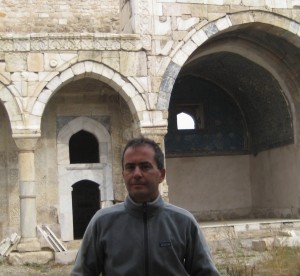
Professor Karateke obtained his PhD from Bamberg University, his habilitation degree from Vienna University and after teaching six years at Harvard, joined the University of Chicago in 2009. He is trained as an Ottoman philologist and literary historian. His dissertation was a historical study which was revised and published with the title Long live the Sultan: Ottoman Ceremonies in the 19th Century in Turkish. The book is a study of changes in the quality and meaning of court ceremonies during the nineteenth century and places them within the context of a general theoretical framework analyzing the use of ceremony as a source of political legitimacy. An English version of the book is in the making. Professor Karateke has edited several Ottoman texts and is working on others. Risale-i taciyye, a treatise on dervish headgears, co-authored with H. Anetshofer, came out in 2001 and An Ottoman Protocol Register in 2007. He is also working on a “Social History of the Ottoman Language.”He is the co-editor of the online encyclopedic project Historians of the Ottoman Empire and, again, the co-editor of the Database for Ottoman Inscriptions.
Click here for Professor Karateke’s publications.
Click here for Professor Karateke’s departmental website.
X
Associate Professor of Ottoman and Modern Turkish History
- “Beauty is Nothing to Be Ashamed of: Beauty Contests as Tools of Women’s Liberation in Early Republican Turkey,” Comparative Studies of South Asia, Africa and the Middle East (Special issue Sex, Gender, and Family Structure)24.1 (2004) 107-122 (guest edited this issue) .
- Between Two Empires: Ahmet Ağaoğlu and the New Turkey. I. B. Tauris, 2003.
Click here for Professor Shissler’s departmental website.
X
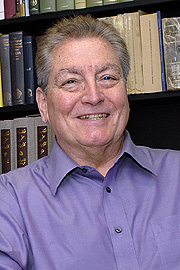 John E. Woods
John E. Woods
Professor of Middle Eastern History
State Formation and Economic History in the Premodern Islamic Middle East, especially in Iran and Central Asia.
Professor Woods focuses primarily on the history of Turkey, Iran, and Central Asia from the 13th to 18th century. He is particularly interested in aspects of the encounter of sedentary and nomadic people in those regions during that time period. He is at present working on several projects dealing with the age of Chinggis Khan and Timur (Tamerlane).
- The Aqquyunlu: Clan, Confederation, Empire. revised and expanded edition. Salt Lake City: University of Utah Press, 1999.
- Fadlullah Khunji-Isfahani’s Tarikh-i Alam-ara-yi Amini, Persian text edited by John E. Woods with an abridged English translation by Vladimir Minorsky, revised and augmented by John E. Woods. London: Royal Asiatic Society, 1992 [released 1993].
- “Timur’s Genealogy,” Intellectual Studies on Islam, Essays Written in Honor of Martin B. Dickson, eds. Michel M. Mazzaoui and Vera B. Moreen (University of Utah Press: Salt Lake City, 1990).
- The Timurid Dynasty, Papers on Inner Asia No. 14, Research Institute for Inner Asian Studies, Indiana University, Bloomington, 1990.
- “The Rise of Timurid Historiography,” Journal of Near Eastern Studies 48 (1987).
Click here for Professor Wood’s departmental website at NELC and here for History Department.
X
RELATED FACULTY
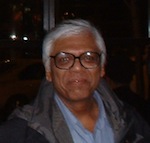
Muzaffar Alam
George V. Bobrinskoy Professor in South Asian Languages and Civilizations
Mughal political and institutional history, history of Indo-Islamic culture
Professor Alam is a historian trained at Jamia Millia Islamia (New Delhi), Aligarh Muslim University and Jawaharlal Nehru University (New Delhi), where he obtained his doctorate in history in 1977. Before joining the SALC at the University of Chicago in 2001, he taught for three decades at the Centre for Historical Studies, Jawaharlal Nehru University, and has held visiting positions in the Collège de France (Paris), Leiden University, University of Wisconsin (Madison), and the EHESS (Paris). His working languages include Persian, Arabic, Hindi and Urdu. Professor Alam has taught courses on the history of the Delhi Sultanate and the Mughal empire, and he has also worked closely with students on advanced Urdu and Persian literary and historical texts.
- The Crisis of Empire in Mughal North India (Delhi: Oxford University Press, 1986)
- The Mughal State 1526-1750 (edited with Sanjay Subrahmanyam) (Delhi: Oxford University Press, 1998)
- A European Experience of the Mughal Orient (with Seema Alavi) (Delhi: Oxford University Press, 2001)
- The Languages of Political Islam in India: c. 1200-1800 (Chicago: The University of Chicago Press, 2004)
- Indo-Persian Travels in the Age of Discovery: 1400-1800 (With Sanjay Subrahmanyam) (Cambridge: Cambridge University Press, 2007)
Click here for Professor Alam’s departmental website.
X
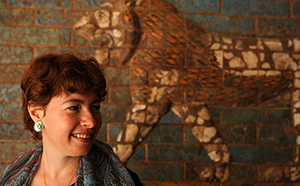 Orit Bashkin
Orit Bashkin
Professor of Modern Middle Eastern History
Iraq, Modern Middle East history
Professor Bashkin’s Ph.D. dissertation (Princeton, 2004) looks at the construction of the Iraqi public sphere and the emergence of democratic discourses in Iraq during the interwar period. Her research interests include Arab intellectual history, modern Iraqi history and the history of Arab-Jews in Iraq and Israel.
Her book The Other Iraq: Pluralism and Culture in Hashemite Iraq, 1921-1958 was published in 2009 by Stanford University Press. Her recent publications include: “Un Arabe juif dans l’Irak de l’entre-deux-guerres Lacarrière d’Anwar Shā’ul” and “To Educate an Iraqi-Jew: Or What Can We Learn From Hebrew Autobiographies about Arab Nationalism and the Iraqi Education System (1921-1952)”. Current project: Others and Brothers: Iraqi Jews and the Iraqi state, 1921-1951 (manuscript in preparation).
Click here for Professor Bashkin’s departmental website. For a publications list click here.
X
 Persis Berlekamp
Persis Berlekamp
Associate Professor of Art History and the College
Islamic art and architecture
Professor Berlekamp specializes in art of late Abbasid and Mongol periods (thirteenth to fifteenth centuries), and works with Arabic and Persian sources. Current research interests include Neoplatonic cosmography and the imaging of natural history, alchemy, and astrology; the application of medieval Islamic traditions of medical illustration to Chinese medicine; and how theoretical understandings of talismans relate to their visual forms.
- “The Limits of Artistic Exchange in Fourteenth-Century Tabriz: The Paradox of Rashid Al-Din’s Book on Chinese Medicine,” forthcoming in Muqarnas 27 (2010).
- Review of Bernard O’Kane, ed., The Iconography of Islamic Art: Studies in Honour of Robert Hillenbrand, forthcoming in Journal of Near Eastern Studies (Spring, 2010).
- “From Iraq to Fars: Tracking Cultural Transformations through the 1322 Qazwini `Aja’ib Manuscript,” in Handbücher der Orientalistik, 90, Arab Painting: Text and Image in Illustrated Arabic Manuscripts, ed. Anna Contadini (Leiden: Brill, 2007), pp. 73-91.
- “Painting as Persuasion: A Visual Defense of Alchemy in an Islamic Manuscript of the Mongol Period” Muqarnas 20 (2003): 35-59 (2003)
- Review of The Persian Album, 1400-1600: From Dispersal to Collection by David Roxburgh, caa.reviews, <http://www.caareviews.org/> 2006.
- “al-Qazwini,”in Encyclopedias of the Middle Ages 2, Medieval Islamic Civilization: An Encyclopedia, (London: Routledge, 2006)
Click here for Professor Berlekamp’s departmental website.
X
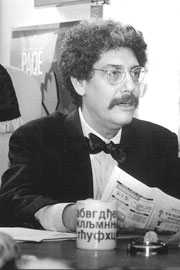 Victor Friedman
Victor Friedman
Andrew W. Mellon Professor of Balkan and Slavic Linguistics
Grammatical categories (particularly the verb), language contact, and sociolinguistics (especially problems of variation and standardization) in the Balkans and the Caucasus. His publications deal with the following languages: Albanian, Aromanian (Vlah), Azeri, Bosnian/Croatian/Serbian (especially the Torlak dialects), Bulgarian, Georgian, Greek, Judezmo, Lak, Macedonian, Megleno-Romanian, Romani, Romanian, Russian, Tadjik, Turkish
Professor Friedman’s many publications center on the languages of the Balkans and Caucasus, especially grammatical categories, language contact and language standardization. Owing to the intimate connections of language with politics and ethnic identity in these parts of the world, his work has of necessity been interdisciplinary. During the Yugoslav Wars of Succession he worked for the United Nations as a policy analyst in Macedonia and consulted for other international organizations including the International Crisis Group and the Council on Foreign Relations. He is a member of the Macedonian Academy of Arts and Sciences, the Academy of Arts and Sciences of the Republic of Albania, the Academy of Arts and Sciences of Kosova and Matica Srpska, and he holds the 1300 Years of Bulgaria Jubilee Medal. He is also the recipient of the 2009 Award for Outstanding Contributions to Scholarship from the American Association of Teachers of Slavic and East European Languages.
Click here for Professor Friedman’s departmental website.
X
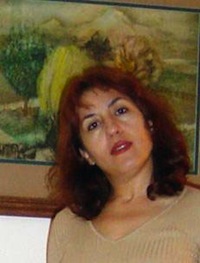 Hripsime Haroutunian
Hripsime Haroutunian
Lecturer in Armenian
Armenian Linguistics and Literature, Armenian Art, Religion, Culture and Traditions, Indo-European Languages and Comparative Linguistics
Dr. Haroutunian grew up in Yerevan, Armenia. In 1993 she received a Fullbright Fellowship to pursue research at the Hittite Dictionary project of the University of Chicago. She has been in Chicago since then. From 1994 to 2001 she worked as a Research Associate in the above mentioned project. Meanwhile she taught a number of Adult Education Courses in Hittite Religion and Culture at the Oriental Institute, and Armenian language at Sisag Varjabedian School of the Chicago Chapter of the Armenian General Benevolent Union. Since 2001 Dr. Haroutunian is teaching courses in Armenian Language (both Classical and Modern) and History and Culture of Armenia at the University of Chicago.
Click here for Dr. Haroutunian’s departmental website.
X
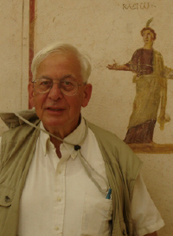 Walter Kaegi
Walter Kaegi
Professor of History
Byzantine and Late Roman Political, Social, Military and Religious Structure; Historiography; European Military History and Strategy; Byzantino-Islamic History
Walter Kaegi’s research concentrates on Byzantine (and Late Roman) history, especially from the fourth through eleventh centuries,with special attention to the seventh century. He investigates relationships between Byzantium and the Near East, including Islam, military and historiographical subjects and their interrelationships with religion and thought. He seeks to set these researches in broader European and Mediterranean contexts. He is the co-founder of the Byzantine Studies Conference and the editor of the journal Byzantinische Forschungen.
- Byzantium and the Decline of Rome. Princeton: Princeton UniversityPress, 1968; reprinted, 1970.
- Byzantine Military Unrest 471-843: An Interpretation. Amsterdam & Las Palmas: A.M. Hakkert, 1981.
- Army, Society and Religion in Byzantium. London: Variorum Revised Editions & Reprints, 1982.
- Byzantium and the Early Islamic Conquests. Cambridge, Eng.: Cambridge University Press, 1992. Paperback, 1995.
- Heraclius Emperor of Byzantium. Cambridge University Press (2003).
 Franklin Lewis
Franklin LewisPersian literature and its intersection with the Arabic-, Turkic-, Indic- and European worlds; comparative literature; mystical and esoteric traditions in the Islamic world
Professor Lewis was trained at U.C. Berkeley and University of Chicago, and taught at Emory University before returning to Chicago. He is particularly interested in the Persian poetry and prose of the Samanid to Timurid, and questions of semiotics, genre, performance, hermeneutics and the sociology of literary production. He is the founder of the Adabiyat list, and President of the American Institute of Iranian Studies and is currently working on a collection of Bozorg ʻAlavi’s stories in translation; an edition and annotated translation of the Maʻâref of Borhân al-Din Mohaqqeq-e Termezi.
- Mevlânâ: Geçmiş ve şimdi, Doğu ve Batı (Mevlânâ Celâleddin Rumi’nin Hayatı, öğretisi ve şiiri (Istanbul: Kabalcı Yayınevi, 2010), 789pp. Turkish translation of Franklin Lewis, Rumi: Past and Present, East and West. (2007, 2nd ed.).
- “One Chaste Muslim Maiden and a Persian in a Pear Tree: Earlier Islamicate Analogues for Two Tales of Chaucer,” in Metaphors and Imagery: Studies in Classical Persian Poetry, ed. Asghar Seyed-Gohrab (Leiden: E.J. Brill, forthcoming).
- “The Semiotics of Dawn in the Poetry of Hāfiẓ,” In Hafiz and the Religion of Love in Classical Persian Poetry, ed. Leonard Lewisohn (London: I.B. Tauris, 2010), 251-78.
- “Sexual Occidentation: the Politics of Boy-love and Christian-love in ‛Aṭṭār,” Journal of Iranian Studies 42, 5 (2009): 693-723.
- “Dar-âmadi bar ta‛yin-e târix-e sarâyeš-e ḡazaliyât-e Mowlânâ,” Iran Nameh 25, 1-2 (2009).
- “Sincerely Flattering Panegyrics: The Shrinking Ghaznavid Qasida” in The Necklace of the Pleiades: Studies in Persian Literature, ed. F. Lewis and S. Sharma (Amsterdam and Leiden University Press, 2010), 209-250.
Click here for Professor Lewis’s departmental website.

